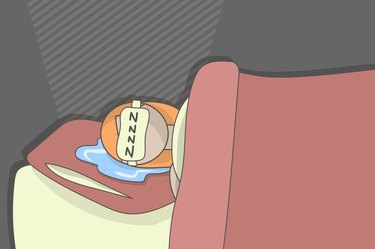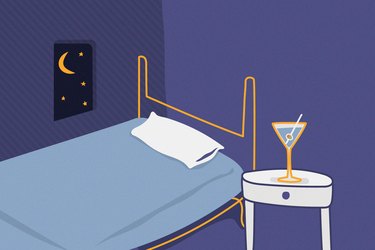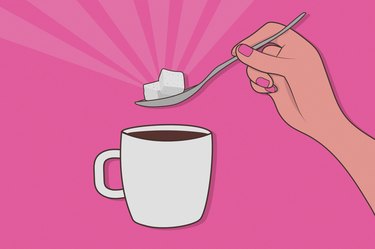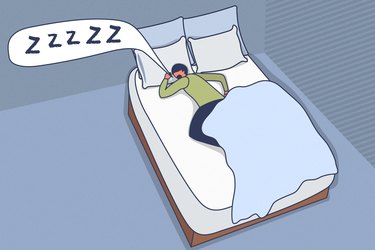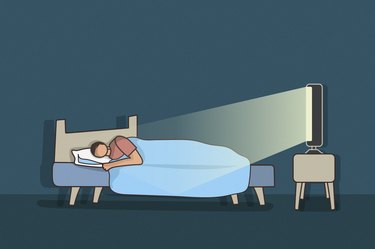
Many people enjoy dessert after dinner. There's something satisfying about chasing down a savory meal with something sweet. Learned behaviors, such as enjoying a bowl of ice cream in the evening, can also fuel your desire to snack on sugar before bed.
The general dangers of added sugars are well known, but still, you might be wondering exactly how eating sugar before bed affects your body — specifically in regard to sleep.
Video of the Day
Video of the Day
To find out, we tapped doctors and registered dietitians to uncover the truth. Whether it's a bowl of sugary cereal, a cup of sweetened tea or a candy bar at night, here's what can happen if you eat sugar before bed.
1. It Can Cause Inflammation
Eating a lot of sugar is heavily associated with chronic inflammation, which is linked to a number of health conditions like heart disease, obesity, cancer and diabetes, per Harvard Health Publishing.
And setting off an inflammatory response in your body might be the last thing you want to do before hitting the hay. Inflammation is linked to sleep apnea. If you have this condition, you'll briefly stop breathing during your sleep, often due to blocked airways, according to the Cleveland Clinic.
"Sugar may cause inflammation of the tissues that line the mouth and throat, causing swelling and increasing mucus production," says neurologist and sleep physician Brandon R. Peters, MD, FAASM. "This can cause post-nasal drip and affect breathing, causing snoring and worsening sleep apnea."
Snoring and sleep disorders may seem harmless, but they should be taken seriously, per the Mayo Clinic.
2. It May Affect Sleep Quality
Although many people think that eating sugar before bed keeps you awake and leads to hyperactivity, there's little evidence suggesting this is actually true. The notion that eating sugar leads to hyperactivity in children, for instance, originates with a single tiny study from the 1970s, per the Academy of Nutrition and Dietetics. In the years since, other larger studies have failed to prove that there's a connection between sugar and hyperactivity, according to the Academy.
That said, refined sugars do rapidly raise blood sugar levels, which could cause the feeling of a rush of energy and make it difficult to fall asleep, Peters says.
"Eating a lot of sugar before bed may cause you to get lighter, less restorative sleep with more arousals," Peters says. "An arousal is an awakening or a transition from deep to lighter sleep. Frequent arousals may undermine sleep quality and may link back to breathing disturbances."
While the research on eating sweets just before hitting the sack is scant, we know that in general, eating too much can affect your sleep, according to MD Anderson Cancer Center. A diet high in sugar has been associated with poor sleep quality and duration, per August 2019 research in the American Journal of Lifestyle Medicine.
Tip
Many sugar-sweetened beverages like soda also contain caffeine, which can affect your sleep if you have it before bed, per the American Journal of Lifestyle Medicine study. If you're having trouble sleeping, limit caffeinated drinks to early in the day.
3. It Could Lead to Weight Gain
Again, there's limited research on how eating sugar right before bed affects your weight. But we do know that excess sugar gets stored in fat cells, according to the Cleveland Clinic.
We also know while you're awake, your body may be able to use that sugar for energy. But at night when you're doing little to no physical activity, having too much sugar could be problematic.
"When we eat sugar before bed, we don't properly metabolize the sugar and it becomes inflammatory," says registered dietitian Dana Ellis Hunnes PhD, RD. "At night when we sleep, we're not burning that sugar off, so it's more likely to lead to fat storage and weight gain."
Eating sugary foods earlier in the day gives you the opportunity to metabolize the sugar so it's used for energy rather than stored as fat.
Tip
A food is considered high in sugar if it has 10 grams or more per serving, per the Harvard T.H. Chan School of Public Health.
So, How Bad Is It Really to Eat Sugar Before Bed?
If you do it all the time, eating sugar before bed could have consequences on your health. While it's always a good idea to practice moderation, it may be better to avoid sugar before bed and enjoy your treats during the daytime hours when you're more active.
"As sugar may act as an inflammatory that disturbs sleep, it is best to avoid it as much as possible close to bedtime. As a general rule, I recommended that someone not eat sugar for 2 to 3 hours before bedtime to allow for proper digestion," Peters says. "That being said, an occasional sweet snack at nighttime is probably not something you need to worry about."
Reducing added sugars in your diet, even by a small amount, can do wonders for your health and your sleep. Aim for a maximum of 6 to 9 tablespoons of added sugar per day, according to the American Heart Association.
- Psychoneuroendocrinology: "Associations between poor sleep and glucose intolerance in prediabetes"
- Journal of Clinical Sleep Medicine: "Fiber and Saturated Fat Are Associated with Sleep Arousals and Slow Wave Sleep"
- CDC: “How Much Sleep Do I Need?”
- CDC: “1 in 3 adults don’t get enough sleep”
- Frontiers in Nutrition: “The Association Between Frequent Sugar-Sweetened Beverage Intake and Sleep Duration in School Children: A Cross-Sectional Study”
- Cleveland Clinic: "5 Foods That Can Cause Inflammation"
- American Heart Association: “Added Sugars”
- Harvard Health Publishing: All About Inflammation
- Mayo Clinic: Snoring
- American Journal of Lifestyle Medicine: Relationship Between Added Sugar Intake and Sleep Quality Among University Students: A Cross-sectional Stud
- Sleep Foundation: Caffeine
- University of Missouri School of Medicine: "Obstructive Sleep Apnea Linked to Inflammation, Organ Dysfunction"
- Cleveland Clinic: "Sleep Apnea"
- Academy of Nutrition and Dietetics: "Sugar: Does it Really Cause Hyperactivity?"
- MD Anderson Cancer Center; "What happens when you overeat?"
- Harvard T.H. Chan School of Public Health: "Added Sugar"

